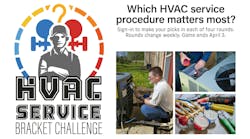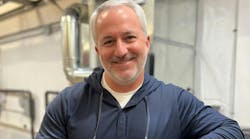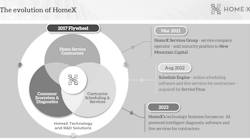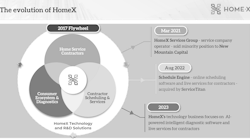by Valerie Stakes, editorial coordinator/associate editor
If you call Tempo Mechanical and ask for the owner, here’s the response you’ll likely hear: “Well, you’re speaking to him!” If you think the customer service representative is pulling your leg, think again. He and most of the other 80 members of Tempo’s team are owners of the $16 million residential new construction and service firm, located in Irving, TX, part of the sprawling Dallas-Ft. Worth region.
In fact, employees refer to each other as “Partners” and their business cards have “Owner/Partner” written on them as part of their titles.
In addition to this intense pride in ownership, there’s a fierce commitment to satisfying customers, which includes builders and homeowners. This dedication to quality isn’t surprising considering Tempo’s heritage. The company got its start as the residential construction division of TDIndustries, Contracting Business’ Commercial Contractor of the Year in 1995.
In 1997, TDIndustries decided to exit the residential service and installation market. According to Steve Saunders, Tempo’s CEO and president, TDIndustries wanted to position Tempo to succeed on its own. “We initially considered selling the division to a consolidator, but after interviewing several of them, it just didn’t seem the best fit,” he says.
After much thought and research, Tempo’s seven principals determined that the best recipe for success was to continue in TDIndustries’ tradition of employee ownership. The group conferred with Jack Lowe Jr., TDIndustries’ CEO, who also thought the self-purchase was a great idea. Lowe and the seven partners quickly hammered out a plan that afternoon. “Our departure from TDIndustries was anything but acrimonious. In fact, the deal was settled with seven $1 bills and a handshake,” Saunders describes.
TDIndustries also facilitated the transfer of the departing employees 401k fund and their ESOP (employee stock ownership plan) so their investments would continue uninterrupted. “We’ve continued to have a great relationship with TDIndustries. We take care of the HVAC service for the majority of their homes, and if you call there after hours, there’s a recording that directs callers to Tempo if they’re in need of residential work,” Saunders adds.
As soon as Tempo was on its own, there was no looking back. “In our first year, we paid off our $1.5 million debt to TDIndustries, doubled our staff from 35 to 70, and were hit with the hottest summer in North Texas history,” he says.
Since then, the company hasn’t just survived, it has thrived. In addition to its financial success in a relatively short amount of time, Tempo has also received numerous accolades such as the Air Conditioning Contractors of America’s (ACCA) National Residential Contractor of the Year Award in 2001 and Excellence Alliance Inc.‘s (EAI) National Residential Contractor of the Year award in 2000.
The Value of Self-ownership
Saunders points to Tempo’s ESOP as a driving force behind the company’s strongly positive corporate culture. “For many, being a part-owner motivates them to work even harder, knowing that their efforts can have a positive impact on the company and their own lives,” he says.
For example, according to Danny McGee, service technician, “Working for Tempo is like owning your own business; you have to do what’s right for the homeowner and for the company.” Mell Benford, service technician, agrees, “As an owner, it’s my responsibility to see that not only does the job get done, it has to be done well.”
After three months, new partners are eligible to contribute up to 10% of their income to buy company stock. The more the company makes, the more funds there are to be distributed among the partners.
Saunders adds that the ESOP program offers employees an investment often more stable than the stock market. It also enables the company to reinvest in itself and have funds for cutting edge equipment, software, and training.
“Unlike many publicly traded companies, we can focus on long-term gains, not just the quarterly financial results. Reinvesting in ourselves will ensure that everyone benefits from the future success of the company,” he says.
A Win-win Relationship
Nearly 85% of Tempo’s work consists of new construction installations. Like many metropolitan areas, many segments of the Dallas/Ft. Worth economy are challenged. However, housing starts have remained very strong with Tempo installing 4,500 HVAC systems in 3000 homes in 2002. In fact, Tempo expects to install 8,000 per year by 2010.
According to David Gannon, vice president, sales/engineering, this success can be directly attributed to a strong relationship with Tempo’s builder customers.
“We understand each other’s challenges and work together toward a common goal, which is to satisfy the homeowner,” Gannon says. ”It’s our job to make sure the homeowner doesn’t call the builder in the middle of the night with an air conditioning complaint.”
Tuan Tran, engineer adds, “Working as a team allows us to have a thorough understanding of the builders’ perspective. If they ask for a change or express a concern, we take it seriously and will take care of whatever they need immediately.”
To help builders and their personnel understand the Tempo perspective, Tempo provides HVAC training. Tom Murrell, project manager, says, “Construction personnel often don’t receive any training in HVAC. We want to make sure they’re familiar with how the HVAC equipment works and how it fits into the home’s design.”
Tempo was also instrumental in keeping their builders apprised of how Senate Bill 5mandating increased energy efficiency in new homes would influence not only the HVAC equipment being specified, but also the home’s design itself.
“We’re biased toward action,” says Gannon. “As soon as we heard of the coming changes, we immediately began working with our builders to make sure they understood the implications of the codes and to make the transition to the new materials and design as smooth as possible.” As a result, “our builder customers didn’t miss a beat and were able to keep up with heavy demand for new homes, which were also code-compliant,” adds Murrell.
Tempo’s proactive nature and dedication to customer satisfaction have certainly not gone unnoticed. One of their very satisfied customers is Lennar Homes, a large residential builder. In fact, in the Dallas-Ft. Worth area, Tempo handles 85% of Lennar’s mechanical installations.
John Winniford, director of construction for Lennar’s Dallas division, says, “In our market, it’s difficult to find a company that cares about us as a client and the homeowners we serve. What’s refreshing about working with Tempo is that they understand our common goal to satisfy the customer. They go above and beyond the call of duty.
“As a builder, the last thing you want to do is align yourself with an HVAC contractor that doesn’t take air conditioning seriously. When you speak to anyone at Tempo, regardless of their title, you get the same sense of understanding and urgency to fulfill the expectations of the homeowners. This is why Tempo has the majority of my business,” Winniford adds.
Jason Oates, director of construction for Lennar’s Ft. Worth division, agrees with Winniford and describes Tempo personnel as “fox-hole kind of people; if a tough situation arises, they’ll take care of it personally.”
Oates says, “Tempo has always been honest and straightforward with us in all of our business dealings. They’re fair with their pricing and will always explain how they arrived at it.”
He adds how Tempo is always at the forefront with its products and services, and he appreciates how he is treated by its staff. “I’ve never met even a mildly disgruntled employee. The whole staff has a great attitude.”
A Streamlined Approach
To further keep builder customers happy and profits humming along, Tempo has developed an approach to new construction design and installation that focuses on efficiency without sacrificing quality.
The process begins in engineering where Tran and Steve Jacobson take detailed blueprints of the home to be built and come up with an individualized design. Murrell says, “We don’t take a cookie-cutter approach to our design. We run a Manual J load calculation for each home.”
From there, the design is sent to the warehouse where Wayne Watson, warehouse manager, creates a prefabrication layout and sends it back to engineering for any fine-tuning. Once this is done, the prefabrication and equipment packaging processes begin. The warehouse staff gathers the ductwork and all the other materials and equipment specified for the job and places everything in a 4-ft x 4-ft. box that’s shrink-wrapped and labeled. It’s then ready to go to the jobsite.
Kerry Hovland, vice president and construction manager, describes how this process has many advantages. “At one point we thought about outsourcing prefabrication. Instead, we’ve discovered we could be 10 times as efficient doing it ourselves,” he says.
“First, buying material in bulk is cost-saving. Second, we ensure that the material needed for a job will be there and we won’t be left hanging at a jobsite waiting for a delivery. Finally, prefab allows us to complete a two-story home in 112 to 2 days,” he says.
Once the installation is complete, the service department steps in to take care of the start-up, testing, and balancing. The technician assigned to handle a particular home is then responsible for subsequent warranty work.
A Jump into Service
When part of TDIndustries, Tempo handled the new construction work but very little service. That all changed when the company went out on its own and jumped headfirst into the service business.
“Not only did we inherit $1 million in business from TDIndustries, we also gained the opportunity to create a phenomenal service department,” says Catherine Smith, vice president and operations manager. “We immediately targeted a solid base of customers who were familiar with us because we had installed their equipment. We also began aggressively marketing to new customers in subdivisions where homeowners likely had seen our more than 20 service trucks.”
Since 1998, Tempo’s service has rapidly grown to become 15% of its business and includes more than 1,800 service agreements. Smith adds, “We plan to continue growing steadily and focus on increasing our service agreement base, not just on equipment sales.”
To help achieve this goal, Tempo hired Greg Gannon as marketing manager. ”We ‘re passionate about great service; it’s my job to make sure our customers are also aware of that fact,” he says.
He relates how last year, Tempo focused intently on gaining new customers, but quickly realized the importance of concentrating on its existing customer base. “Our goal for 2003 is to grow our service agreement base and develop even better relationships with our current customers,” Gannon says. “A base of happy customers could easily turn into a referral machine.”
Tempo reaches its customers with a minimum of three direct mail pieces per year, in addition to its reminder notices for service. There’s a monthly newsletter called Airwaves, equipment giveaways, and packages of wildflower seeds featuring service and equipment specials. ”There’s no magic bullet that reaches every customer, so we keep trying different things. Sometimes you learn the most from what doesn’t work,” he adds.
Service with a Smile
When Tempo partners talk about their commitment to customer service, they’re not just talking about their builder clients; homeowner happiness is equally paramount.
“We do anything necessary to make it right for the customer,” says Smith. “Our technicians are empowered to make their own decisions in the field to make the customer happy. The same goes for our customer service representatives. If need be, they can extend a warranty, waive fees, etc.”
Customers and employees alike appreciate this approach. Just ask McGee. “At my previous job, our employer was more concerned with ticket averages than customer satisfaction,” he says. ”Here, we bend over backwards to make the customer happy, which lets me do my job right.”
According Abiel Gonzaga, client services manager, “Customers appreciate our personal touch. When they call, they often ask for ‘their’ service technician.”
Belinda Schnorrbusch, another client services manager, adds, “Small things such as a reminder call to the customer the day before service is scheduled can really make a difference. We’ll also call customers whose maintenance contracts have just expired to remind them that they’re still owed a service check.”
To monitor its performance in the field and in the office, Tempo sends out surveys to customers each time they have service or replacement work done. “We started the survey program two years ago to see what customers thought of our service and to find ways to improve,” says Smith. “We were amazed at how many good scores we received.” In fact, in 2001, 4,000 customers returned the survey; 98% of them said they would refer Tempo to friends or family.
However, those few low scores (anything below 7 on a scale from 1-10 is a failing score) are taken very seriously. “The people who respond are either very happy or displeased. If they’re unhappy, we’ll call or send a letter, depending on the problem,” Smith adds. “It’s amazing how happy people are when you call because they want the problem to be resolved. They also can turn into your most loyal customers.”
Saunders comments on how the surveys can be an additional motivator for the service technicians. “Every week, the technicians get their feedback and scores from the evaluations,” he says. “This lets them know where to improve, and they always want to beat their scores.” The comments are then published in Tempo’s internal monthly newsletter. “We post the good and the bad so everyone is aware of how we’re doing. It works great.”
Certifiably Comfortable
For Tempo’s add-on/replacement group, comfort is very important. “Anyone can sell air conditioning equipment — we sell comfort,” says comfort consultant Randy Chandler. “We have a comfort questionnaire to evaluate both the system and the customer’s needs. We can then propose a whole package, including duct renovation, equipment change out, indoor air quality equipment, anything to make them more comfortable in their home.”
Chandler comments how homeowners are becoming increasingly sophisticated, and many know exactly what equipment they want in their homes. “For those who need guidance, I suggest what I would have in my own house. We don’t try to oversell.”
Another means of ensuring customer comfort is for all service techncians to be NATE-certified, says Gary Coulson, service manager. “We have five levels of technicians, and originally, there were five tests,” he says. “Just over a year ago, we replaced the level 3, 4, and 5 tests with the NATE certification exam. Within this past year, we’ve gone from having three certified technicians to 15. Our goal is for all high level and lead technicians to pass the NATE test.”
John Pope, field service manager, states having NATE certified exams further assures customers that they’re receiving the best service possible. “Customer awareness about the NATE certification is growing. In fact, some customers call in and request certified technicians,” he says. “Soon we’ll be able to tell them that all of our techs are certified.”
A Place to Grow
Many contractors find that their biggest challenge is finding and retaining good employees. For Tempo, that has rarely been a problem. “Overall, we’ve experienced little turnover at Tempo,” according to Ken Cavanaugh, vice president andcontroller. “In fact, we haven’t advertised for help in three years. People hear by word-of-mouth that Tempo is a great place to work. We also have a very extensive hiring process that ensures whom we hire is a good fit.”
He adds, “Our direction at Tempo is to always do the “right thing. ’This means continuing to provide training to our partners and provide them with the best possible tools to complete their tasks.”
When asked what drew them to and keeps them at Tempo Mechanical, most partners will cite the family atmosphere and the ability to make a difference in the company. “Your opinion is valued here,” says Gloria Copeland, accounts payable administrator. “There’s a freedom to get involved in a wide variety projects, and if you have an innovative idea, you’re encouraged to run with it.”
Peggy Byrd, human resources coordinator, agrees. “We’re an action-oriented company. Every day brings a new challenge.”
Many also feel Tempo is a place where they can grow professionally and personally. In fact, all partners need to obtain 40 hours of training per year, regardless of their position. Although technical, business, and customer service training is strongly encouraged, employees aren’t limited to these subject matters. “I’m a strong believer in a liberal arts education. If you can prove that it will help you on the job, we’ll approve just about any course,” says Saunders. In addition, Tempo regularly provides Spanish and English language classes for technicians and supervisors, and all corporate and human resources communications are bilingual.
Many employees also participate in business associations such as ACCA and the Rotary Club, and the company itself works with Habitat for Humanity, Operation Kindness (a no-kill animal shelter), and a local children’s hospital. ”We encourage all employees to take on leadership roles in whatever organization suits them best. It teaches communication skills and enriches their lives, which makes them better partners,” Saunders adds.
A Bright Future
When asked about Tempo’s future, Saunders comments that the company will never be content to rest on its laurels. “We’ll never be done planning to better define our direction and to find ways to improve,” Saunders says.“ He adds that their goal for the next five years is to become bigger, better, more efficient, and, as a result, more profitable. “We’re excited about the opportunities ahead, and with our partners, the sky is the limit.”










